In Africa, Moscow battles against LGBTQ rights, side by side with U.S. religious conservatives
Colin Stewart is a 45-year journalism veteran living in Southern…
Russia donated $300,000 for Africa-wide anti-gay conference in Uganda
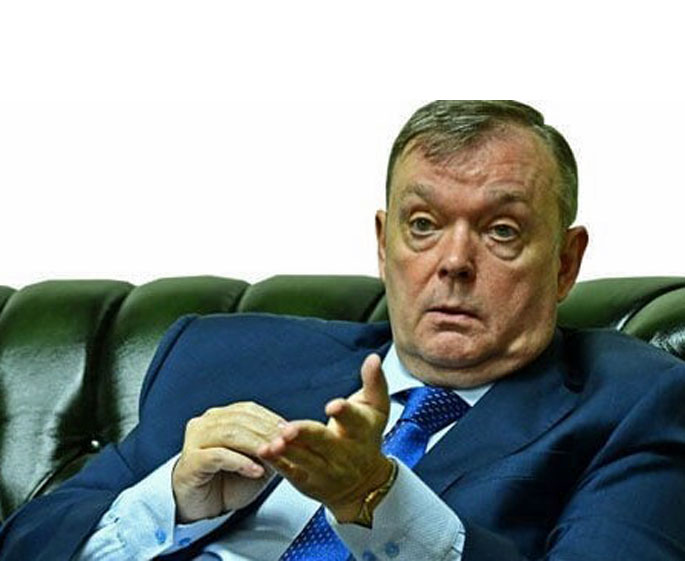
The government of Russian President Vladimir Putin, African politicians and activists from the American religious right have been working side by side to push for anti-homosexuality laws in Africa, the Wall Street Journal reports.
Highlights of the Wall Street Journal article of Sept. 22 include:
- On Jan. 25, 2023, Vladlen Semivolos, the Russian ambassador to Uganda, met Speaker of Parliament Anita Among in her office and urged her to push for quick approval of the Anti-Homosexuality Bill, which provides the death penalty for repeated consensual same-sex intimacy.
- In March 2023, Russia supplied $300,000 to Uganda to host lawmakers from across Africa for a conference on how to resist Western pressure on issues like gay and reproductive rights.
- On March 20, when Uganda’s parliament voted on the Anti-Homosexuality Bill, around a dozen Ugandan lawmakers joined the vote remotely from Moscow, where they were attending a conference of Russian and other African parliamentarians dubbed “Russia-Africa in a Multipolar World.”
- The Russian ambassador denies making that $300,000 transfer or pushing for passage of the Anti-Homosexuality Bill.
- An email announcing the $300,000 payment went to Sharon Slater, president of the anti-LGBTQ American advocacy group Family Watch International, one of the organizers of the Ugandan conference.
- Slater says she and Family Watch weren’t aware of any Russian funding for the conference and never had any involvement with the Russian government on any African issues.
- She spokes at a 2014 conference in Moscow that was organized by the anti-gay World Congress of Families.
- In her speech at the Uganda conference, Slater claimed that the U.N. and international aid groups are “after the children” and that they promote sex education that will “capture their hearts and minds to recruit them to their cause.”
- Slater says Family Watch has never supported anti-LGBTQ legislation in African countries and wasn’t “responsible for the treatment of homosexuals under African laws.”
- Ugandan President Yoweri Museveni says that Slater convinced him to remove a section of the bill that would have made it a crime simply to identify as LGBTQ.
- Attendees at the Ugandan conference included anti-gay legislators from Ghana who proposed the harsh anti-LGBTQ bill that Ghana’s parliament passed in February 2024 and that is currently awaiting action from the President and Supreme Court.
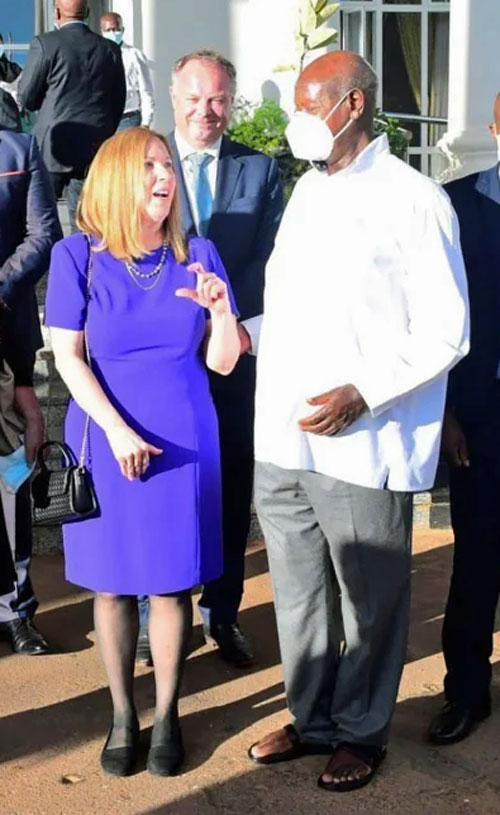
This is the Wall Street Journal article:
Russia and U.S. Religious Conservatives See Common Foe in Africa: Gay Rights
Unlikely coalition provides moral support for local activists pushing laws criminalizing homosexuality; death penalty in Uganda
By Nicholas Bariyo and Gabriele Steinhauser
KAMPALA, Uganda—The message landed in the inboxes of Ugandan parliamentary staffers on the final Tuesday in March last year: Russia’s embassy had just transferred $300,000 for them to host lawmakers from across Africa for a conference on how to resist Western pressure on issues like gay and reproductive rights.
CC-ed in the email, which was viewed by The Wall Street Journal, was another name: Sharon Slater, president of Family Watch International, an Arizona-based conservative lobby group and one of the organizers of the event.
Slater, a prominent Mormon activist and the wife of a senior Intel executive, has spent the past quarter-century working with officials from Africa, Europe and the Middle East to oppose abortion, gay marriage and sex education not centered on abstinence. Now, the mother of seven’s efforts have merged with a broader, ultraconservative movement that encompasses the government of Russian President Vladimir Putin, African politicians and activists from the American Religious Right.
Russian diplomats and American conservative activists present themselves as protectors of what they call “traditional African values” from the pressures of a neocolonial, decadent West. Emboldened governments have begun passing sweeping antigay legislation, putting some of America’s closest allies on the continent increasingly at odds with Washington, where the Biden administration has made the protection of LGBTQ rights a central plank of its Africa policy.
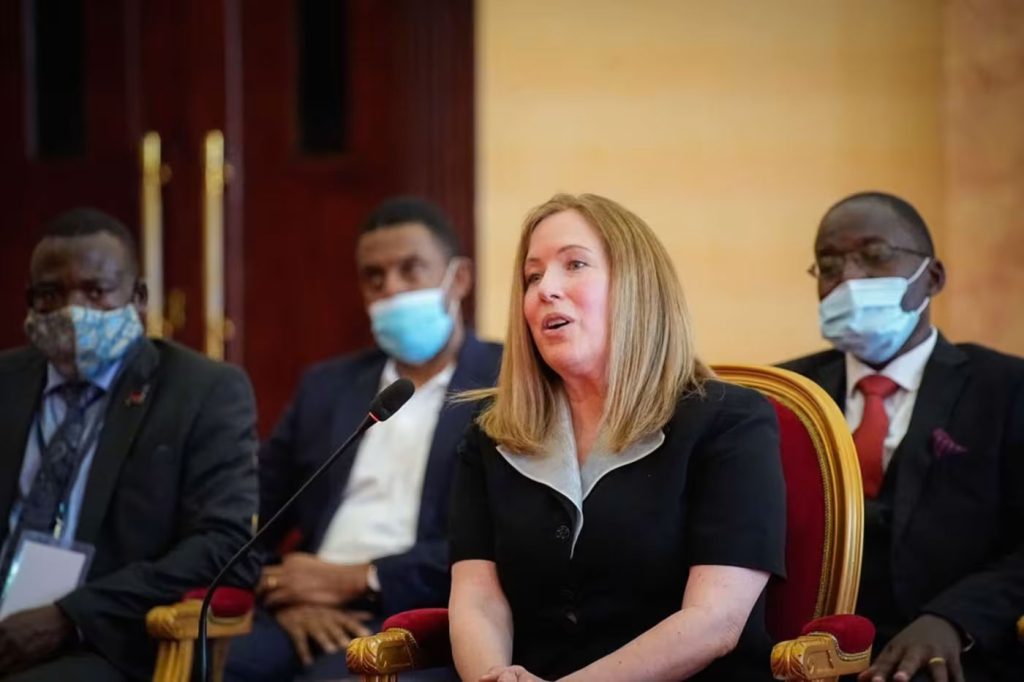
LGBTQ activists say the campaign has endangered the lives of gay and transgender Africans, especially in Uganda, now home to one of the world’s strictest antigay laws, where repeat convictions for gay sex carry the death penalty and merely teaching about same-sex attraction or gender nonconformity risks a prison sentence of up to 20 years.
In response to questions from the Journal, Slater wrote that she and Family Watch weren’t aware of any Russian funding for the conference and never had any involvement with the Russian government on any African issues. She said Family Watch has never supported anti-LGBTQ legislation in African countries and wasn’t “responsible for the treatment of homosexuals under African laws.”
This article is based on interviews with Ugandan and international officials familiar with the 2023 conference and efforts in the preceding months to pass the new law. The Journal also reviewed confidential documents and recordings from the conference, which was held in the lakeside town of Entebbe a few days after the Russian money arrived, as well as messages from a WhatsApp group whose members included Slater and dozens of Ugandan parliamentarians.
At the Entebbe gathering, which Slater attended, lawmakers from around 20 African countries agreed on a common set of principles, including a pledge to outlaw homosexuality and legally define a person’s gender as either male or female. Months earlier, Russia’s ambassador in Kampala met the speaker of Uganda’s parliament to urge her to fast track a new anti-LGBTQ law.
Russia’s ambassador in Uganda, Vladlen Semivolos, denied that his embassy transferred $300,000 to the Uganda Women Parliamentary Group, which hosted the 2023 conference. He added that, while he had spoken with Ugandan parliamentarians and other officials about Russia’s anti-LGBTQ laws, he never advocated for passing such legislation in Uganda.
The Russian Foreign Ministry didn’t respond to requests for comment.
Decades-old roots
The links between Moscow and the American Religious Right can be traced back to the 1990s, when conservative activists from the U.S. poured into Russia, eager to spread their views on abortion and homosexuality in a country where the Russian Orthodox Church was enjoying a revival after decades of persecution under Communism. Among them was Allan Carlson, a historian, who went on to found the World Congress of Families, or WCF, with Anatoly Antonov, a sociologist at Moscow State University, for like-minded academics and activists.
It was at the WCF’s gathering in Geneva in 1999 that Slater, a member of the Church of Jesus Christ of Latter-day Saints, said she experienced a political awakening of sorts. Speakers at the congress, Slater wrote in her 2009 memoir, “Stand for the Family,” laid out how “radical feminists” at groups like the International Planned Parenthood Federation and Western governments were using the United Nations to embed abortion and gay rights into international agreements.
“I had never been exposed to anyone who was actually trying to undermine the family,” Slater wrote.
Later that year, Slater founded the nongovernmental organization that would become Family Watch International. Over the next few years, the group expanded its influence, gaining consultative status at the U.N., where it has worked to block the inclusion of reproductive and gay rights in international agreements. That has sometimes put it in the same camp with authoritarian governments under U.S. sanctions, including Russia, Iran and Syria.
“We’ll partner with anyone who believes in the value of family,” Slater told a journalist in March 2010.
Slater and her husband Greg, a corporate lawyer who was beginning to climb the ranks at chip maker Intel, also remained regular attendees at WCF events around the globe, just as the group began picking up powerful Russian allies.
Chief among them were Konstantin Malofeev, a wealthy businessman and media baron whose support of the Russian Orthodox Church won him the nickname “God’s Oligarch,” and Vladimir Yakunin, then the head of Russian Railways and one of Putin’s oldest confidants. Both men have backed legislation inside Russia restricting LGBTQ rights that helped Putin portray himself as a global standard-bearer for traditional values.
Moscow congress
The U.S. and the European Union sanctioned both Malofeev and Yakunin in 2014 for allegedly supporting Russia’s annexation of Ukraine’s Crimean Peninsula and Russian-backed separatists in eastern Ukraine.
The sanctions prompted the WCF to pull out of what was supposed to be its biggest gathering yet: a congress for thousands of conservative activists sponsored by Yakunin and Malofeev and held inside the Kremlin and Moscow’s iconic, golden-domed Christ the Saviour Cathedral. In attendance in Moscow was Slater, who, according to a program published at the time, spoke about her efforts to “protect children and families at the United Nations.”
In the following years, Slater spoke at several WCF and other policy events in Africa, where she accused U.N. agencies of working to “mainstream homosexuality and transgender ideology into the laws, policies and programs of every African country.”
To connect with African audiences, Slater often starts out by mentioning the three children she and her husband adopted from Mozambique in 2009 after their parents died of AIDS, saying that this family connection gives her a stake in the continent’s future. But she also regularly sprinkles her comments with anti-Western statements reminiscent of rhetoric coming out of the Kremlin.
“You have these Western governments, especially in Europe and Canada, Australia, who think Africa is backwards, they need to change all their laws, they need to accept LGBT issues, they need to have abortion, they need to liberate their children from their parents’ sexual values,” Slater told a Ghanaian TV network in November 2019, days after speaking at a WCF conference in Accra.
The Kremlin became more active in promoting anti-LGBTQ policies in Africa after the U.S. and other Western governments scaled up sanctions against Russia in response to its full-scale invasion of Ukraine in February 2022, said Kristina Stoeckl, co-author of a 2022 book on Moscow’s role in the global culture wars and its relationship with the American Religious Right.
“For Russia, the stakes are really high, because it has lost so much status,” said Stoeckl, a professor of sociology at LUISS Guido Carli University in Rome. “They need an opportunity to gain new allies.”
Death penalty
Ruled with an iron grip by President Yoweri Museveni since 1986, Uganda has long been a focal point for American conservatives. First Lady Janet Museveni, a Pentecostal Christian and also Uganda’s education minister, had over the years spoken at WCF and Family Watch events.
Same-sex relationships were already illegal in Uganda under a rarely enforced colonial-era law. But in late 2022, conservative lawmakers and activists in the country began discussing legislation to add new strictures. In addition to increasing punishments—including the death penalty in some cases—they also wanted to force private citizens to report any suspected homosexual behavior to the police and ban landlords from renting to LGBTQ people.
Some of these conversations took place in a private WhatsApp group that, in addition to dozens of conservative Ugandan lawmakers, also included Slater and a small number of other international activists.
Family Watch says it “has never advocated for or lobbied in favor of Uganda’s anti-homosexual bill” and that it has opposed the 2023 bill and a previous one.
Three members of the WhatsApp group, which has since been disbanded, said Slater was a regular participant, posting dozens of times over several months, including an invitation for a December 2022 Zoom call she hosted. During the call, Slater claimed that homosexuality was caused by abusive fathers and overprotective mothers, as well as childhood bullying, marginalization or porn addiction and was hence “reversible and curable,” according to a person who participated and took notes.
In response to questions from the Journal, Slater wrote she has never claimed to know what causes homosexuality or that it was reversible. Her lawyer said the account of the Zoom call was “inaccurate and taken out of context.”
Around that time Russian diplomats in Uganda were pushing the new law with local officials.
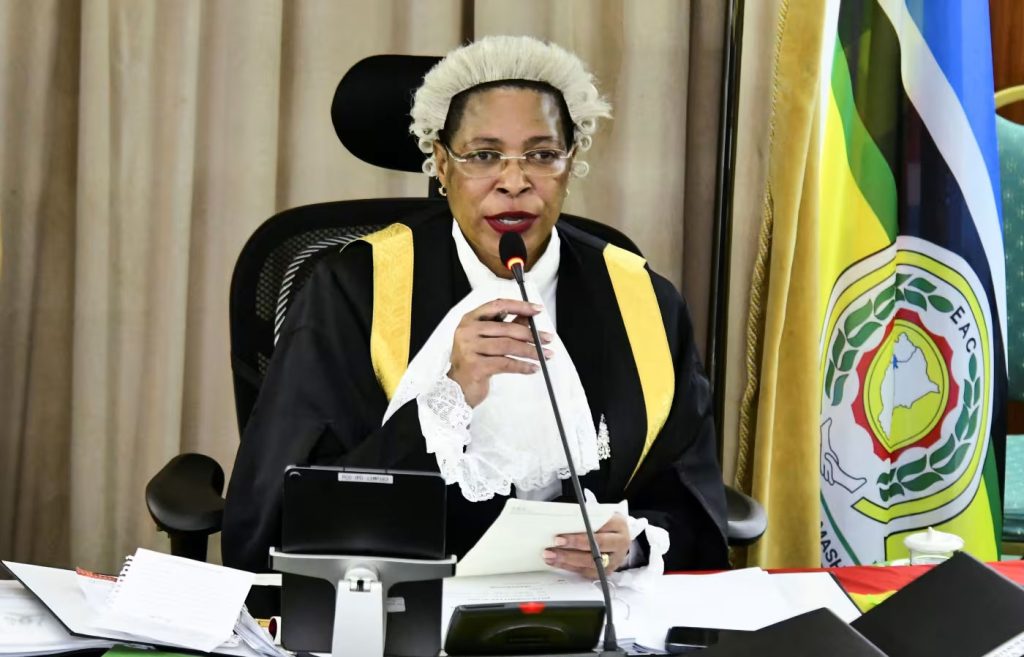
On Jan. 25, 2023, the Russian ambassador to Uganda, Semivolos, met Speaker of Parliament Anita Among, in her office and urged her to fast track the legislation, according to Ugandan officials familiar with the meeting, warning that Western governments were promoting “homosexuality propaganda” in schools and saying Uganda, like Russia, should protect its cultural values.
A spokesman for Among confirmed that the speaker met the Russian ambassador in her office, but declined to provide details on what they discussed beyond saying that the meeting “focused on Ugandan interests.”
Semivolos said he never discussed plans for anti-LGBTQ legislation in Uganda with Among.
The legislation, known as the “Anti-Homosexuality Act,” was introduced in Uganda’s parliament on March 9, 2023, and passed by an overwhelming majority of lawmakers just 12 days later.
“This is the time you are going to show us whether you’re a homo or you’re not,” Among told a packed chamber, urging every lawmaker to vote for the bill.
Around a dozen Ugandan lawmakers joined the vote remotely from Moscow, where they were attending a conference of Russian and other African parliamentarians dubbed “Russia-Africa in a Multipolar World.”
The Russian embassy in Kenya cheered its passage on social media. “African countries stand firm to protect traditional values!” the embassy wrote on X.
“Russia was one of the critical drivers behind this legislation,” said Fox Odoi-Oywelowo, a member of Museveni’s ruling party and one of only two lawmakers who voted against the law. “The Russians and other hate groups, some from America, are galvanizing members of parliament, religious leaders and other fundamentalists.”
The Biden administration, the EU and the U.N. condemned the legislation, threatening to freeze some aid payments and other support for Uganda if President Museveni signed it into law.
$300,000 transfer
Before the bill was approved by Uganda’s parliament, Slater had been working with politicians in the country to bring together conservatives from across Africa, according to two Ugandan officials. A Microsoft Word document of an early draft of the program viewed by the Journal listed a user called “Sharon Slater” as the last person who modified the document on March 8, 2023.
Confirmations were coming in slower than anticipated, however. Some of the Ugandan organizers worried that the travel costs were stopping some lawmakers from attending. Sarah Opendi of the Uganda Women Parliamentary Group then arranged to meet Semivolos, the Russian ambassador, at the Sheraton Hotel in Kampala to ask for financial support, according to the two Ugandan officials.
The email confirming the transfer of $300,000 to the bank account of Opendi’s group arrived a week later, on March 28, 2023. The Ugandan officials confirmed that they saw the transfer on the account itself and that the money was used to pay for conference expenses, including flights and hotel rooms for attending lawmakers. Opendi declined to comment on the payment.
Multiple speakers at the conference, held in an upscale hotel on the shores of Uganda’s Lake Victoria, celebrated Slater as a longtime ally, and congratulated Uganda on the passage of the law, according to a recording obtained by the Journal.
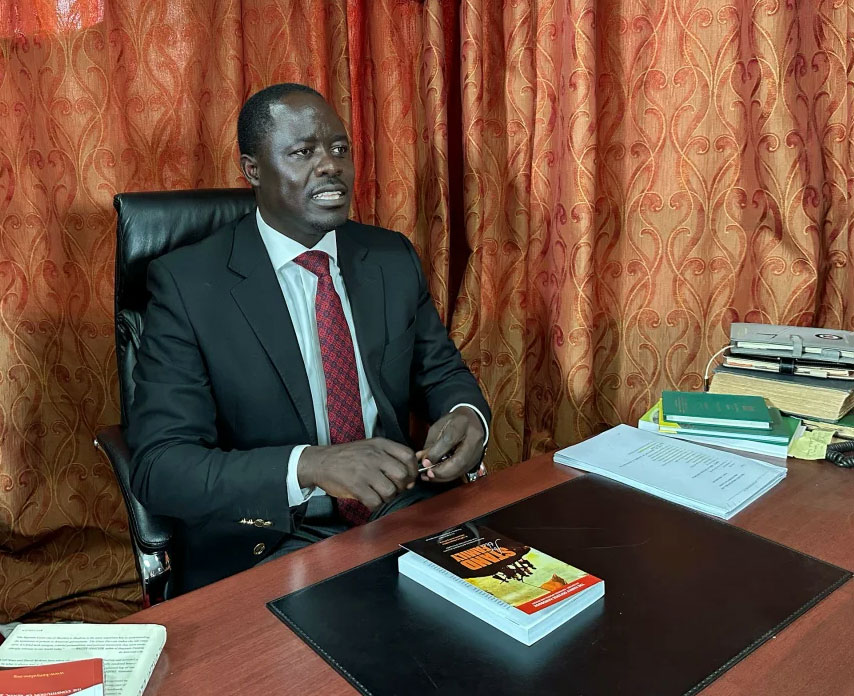
“Homosexuality—LGBTQIA+ or how they call it—is not African,” Chris Baryomunsi, Uganda’s information, communications and technology minister, told participants, earning appreciative chuckles and applause. “Do not come here to destroy the African family.”
When it was her turn to speak, Slater accused the U.N. and international aid groups of backing sex education for young people to undermine their parents’ cultural values.
“They know that the children are going to be the future leaders of your societies and they will capture their hearts and minds to recruit them to their cause,” Slater, who had traveled to Uganda with her husband, told the audience. “They’re after the children.”
Greg Slater didn’t respond to requests for comment. An Intel spokesperson said “we hold ourselves to high standards by creating an inclusive culture,” and that any attendance at the conference wasn’t done in association with the company.
The following day, Sharon Slater and other high-level guests were taken to the state house in Entebbe for separate meetings with President Museveni and the first lady.
“I cannot tell you the power that I think will reverberate across Africa, that will affect the whole world, from this conference,” Slater told Janet Museveni in comments later broadcast on Ugandan state television.
Slater, in her response to Journal questions, shared an Aug. 30, 2023, letter from President Museveni in which he states that neither she nor Family Watch had prompted or supported the Ugandan law.
“On the contrary, when Sharon spoke to us, she advised us about creating a safe haven clause for the homosexuals and for people with unwanted same sex attraction, to get help and not punishment,” Museveni wrote. He added that Slater’s comments convinced him to remove a section of the law that would have criminalized merely identifying as LGBTQ.
At the end of the final day of the conference, on April 1, 2023, attending lawmakers unanimously passed a set of principles, including a pledge to outlaw homosexuality and place limits on sexual education, according to Baryomunsi, the Ugandan minister, and another lawmaker present.
‘We don’t feel safe’
President Museveni signed Uganda’s Anti-Homosexuality Act into law in May 2023, though some provisions were later removed by the country’s constitutional court, including the ban on renting to gay people and the requirement to report suspected LGBTQ behavior to police. The U.S. suspended Uganda from a trade deal granting African countries preferential access to the U.S. market. The World Bank froze funding for new projects.
In September 2023, a group of Kenyan lawmakers who had attended the Entebbe conference entered their own anti-LGBTQ bill. The bill, which the Kenyan parliament hasn’t voted on, includes a fine or jail sentence of up to one year for addressing someone by a pronoun that differs from the sex they were assigned at birth and at least five years for performing in a drag show.
The parliament of Ghana, where gay sex is already illegal, in February this year passed a new anti-LGBTQ bill, also proposed by lawmakers that attended the Entebbe conference. The legislation includes jail sentences of up to three years for merely identifying as “lesbian, gay, transgender, transsexual, queer, pansexual or nonbinary.” Ghana’s president, Nana Akufo-Addo, has said he is waiting for a ruling from the country’s top court before deciding on whether to sign the bill.
Rights groups in Uganda say the 2023 law has led to a sharp increase in violent attacks against gay Ugandans and pushed much of the LGBTQ community underground. Other openly gay Ugandans have fled to neighboring countries.
“It’s as if everyone has the right to attack and violate the rights of LGBTQ people,” said Clare Byarugaba, a Ugandan gay-rights activist.
Health workers say that the threat of punishment has also stopped gay and transgender Ugandans from seeking medical care, including treatment for HIV and screenings for sexually transmitted infections.
“Many patients who used to get their HIV medication from here are now afraid to come,” said Brain Aliganyira, founder of the Ark Wellness Hub, a Kampala clinic that offers health services to the LGBTQ community.
Staff at the clinic have pulled down its signpost and removed health-information leaflets from the hallways to avoid being targeted by authorities. On a recent weekend, a man arrived for a doctor’s appointment wearing a black face mask and a hoodie so he couldn’t be identified as he entered the clinic.
“My neighbors reported me to my previous landlord and he evicted me,” he said. “We don’t feel safe at all since this new law was passed.”




